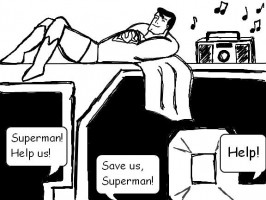Waiting for Superman not the solution to failing school system

Davis Guggenheim’s new documentary, Waiting for Superman, states that teacher unions are the main reasons why the American school system fails to adequately educate children. On a bigger scale though, these unions are not the main causes.
Guggenheim says the main problem with unions (which nearly all public school teachers join) is tenure—the rule that protects permanent employment after two years of teaching in public schools. There are teacher evaluations for tenured teachers, but they are rarely thorough and are essentially meaningless, the film alleges, and this allows incompetent teachers to stay employed after two years. Thus—with the belief that “good teachers make good schools” –Guggenheim thinks this is the main problem ruining the public school system.
The question we should ask is, “Are the incompetent teachers failing to adequately educate children, or is it the entire system itself?”
If you think good education consists of memorizing facts, scoring higher on tests, getting jobs, and obeying authority—then incompetent teachers are the problem. Thus, we should eliminate or reform teacher unions if we want this type of education.
But if you think good education consists of developing a life-long curiosity for all types of knowledge, and helping individuals question authority and think for themselves—the entire system is the problem. As long as the system stays the same, children will not become individuals. Eliminating or reforming teacher unions will only enforce the current system that consists of memorizing facts, scoring higher on tests, etc.
Humans are born with infinite curiosity. Remember when you were a child and you constantly asked questions? See how babies try to put in their mouth every object they can find? This is the innate curiosity in human behavior. But as we grow up, the outside world begins to suppress that. We start meeting authority figures who “know more than us” and try to “teach us.” We are not encouraged to question or expand our individuality. The authority figures start ignoring our “childish” questions more and more with each grade level, telling us what is wrong, what is right, who we should obey, who we should trust, who we should ignore and who we should dislike. And when we build up restrictions on our innate curiosity, education becomes a mechanical process of repetition instead of one that expands students’ minds for free thought. By the end of high school, we are only a few years away from being a totally ruined canvas: completely average, conventional and uncreative, when so much else could have been.
There are exceptions to the system at times, such as teachers who really try to get students to think and question. Many students will break out of convention, as well. But for the vast majority, this is rarely the case.
The most important thing to note is that gaining knowledge in these classes can be very engaging and constructive; it’s breaking out of conventional thought that is hard—thinking about things we are not taught and asking questions about them.
Question authority and what you are taught, but do it rationally—not to provoke conflict, but to expand your mind. And don’t think I have an authority on this. Don’t be fooled: though I talk about breaking out of convention, it doesn’t mean I’ve brilliantly and totally broken out. Nobody has except the geniuses—great philosophers, great artists, great musicians, etc. You are just as smart as I am, as they are, as anyone. Each of us is the smartest person on the planet. We just don’t know it until we totally break free.
